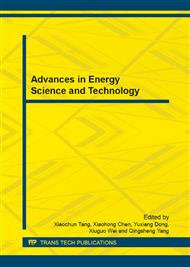[1]
CHEN Heng. The stability analysis for power system[M] . Beijing : Hydraulic and Electric P ower Press , (1995).
Google Scholar
[2]
G. Levitin,A. Kakyuzhny, Ashenkman,M. Chertkov. Optimal capacitorlocation in distribution systems using a genetic algorithm and a fastergy loss, IEEE Transaction on Power Delivery. Vol. 15, No. 2, April (2000).
DOI: 10.1109/61.852995
Google Scholar
[3]
Wen Fu-Shuan, Han Zhen-Xiang. The calculation energy losses in distribution systems based up on a clustering algorithm and an artificial neural network model. Proceedings of the Chinese Society for Electrical Engineering, 1993, 13(3): 41~50.
Google Scholar
[4]
http: /www. chinapower. com. cn/newsarticle/1131/ new1131851. asp.
Google Scholar
[5]
Feng Linqiao,Xu Wenyu,Liu Fei.Calculation and apportionment of real-time electric energy loss in power network[J].Proceedings of the CSEE,2004,24(2):66-70(in Chinese).
Google Scholar
[6]
Wen Fushuan, Chen Qingsong, Chu Yunlong, et al. Potential impacts and issues for energy-saving dispatching[J].Journal of Electric Power Science and Technology,2008,23(4):72-77(in Chinese).
Google Scholar
[7]
CHEN Shu-yong, SONG Shu-fang, LI Lan-xin, et al. Survey on smart grid technology[J]. Power System Technology, 2009,33(8):1-8.
Google Scholar
[8]
HU Xue-hao. Smart grid— a development trend of future power grid[J]. Power System Technology, 2009,33(14):1-5.
Google Scholar
[9]
DU Gui-he, WANG Zheng-feng. Design and Research on power network dispatching integration of smart grid[J]. Power System Protection and Control, 2010,38(15) :127-131.
Google Scholar
[10]
WANG Yong-hua, WANG Zheng-feng2, Research and application of power load measurement and on-line power network loss compute based on SCADA/EMS system [J]. Power System Protection and Control, 2012 , 40 (4): 96-100.
Google Scholar
[11]
LIU Ruihua, LIU Junyong, Power Purchasing Portfolio Optimization and Risk Measurement Based on Semi-absolute Deviation[J], Automation of Electric Power Systems, 2008, 32(23): 9-13.
Google Scholar
[12]
LIU Junyong, LIU Ruihua, Electricity Procurement Optimal Decision-Making Model of Power Supply Company Based on Absolute Deviation Risk Measurement[J],Proceedings of the Chinese Society of Universities for Electric Power System and its Automation,2009,21(5): 3-5.
Google Scholar


